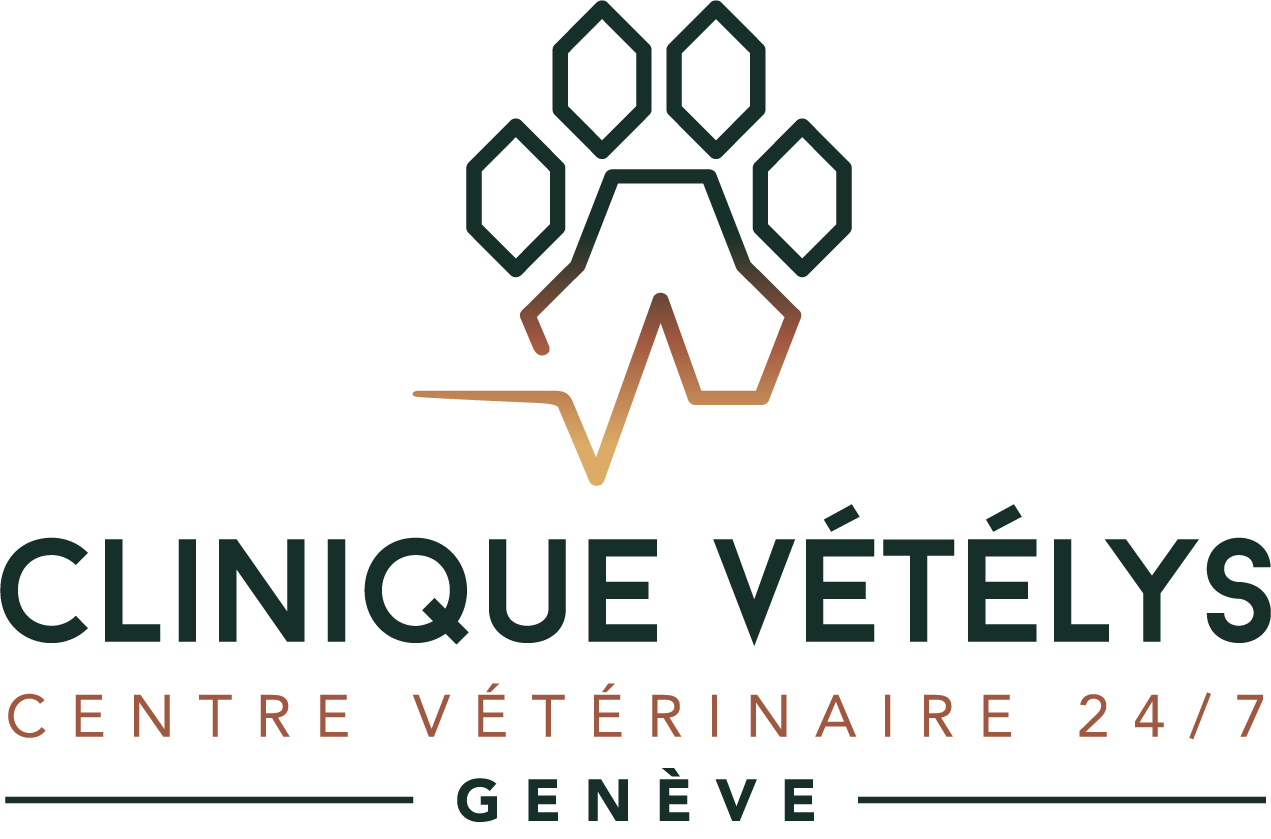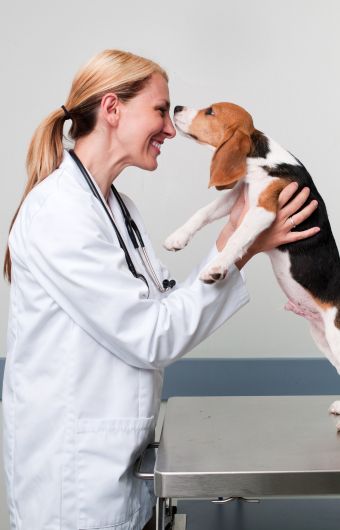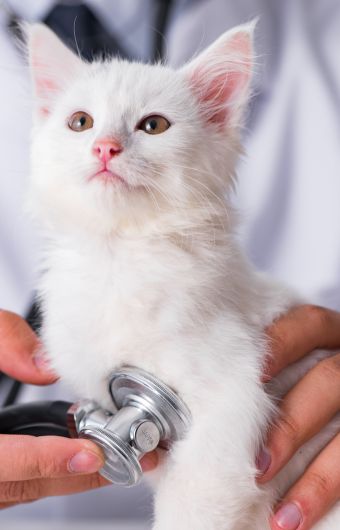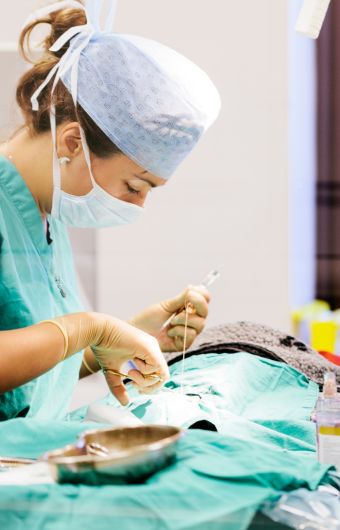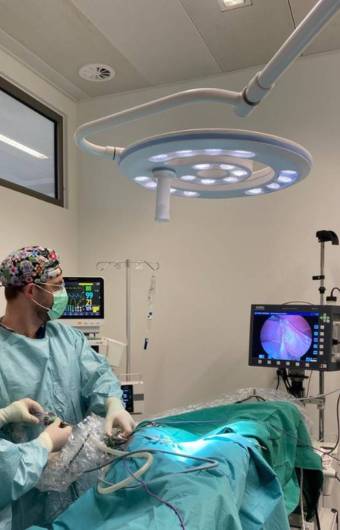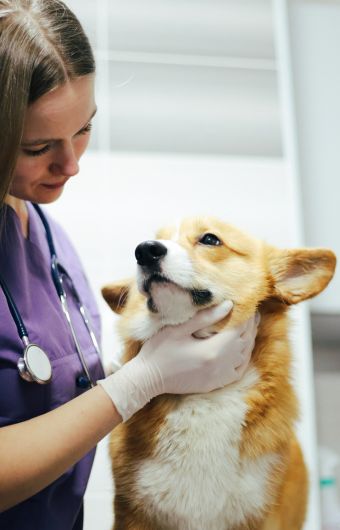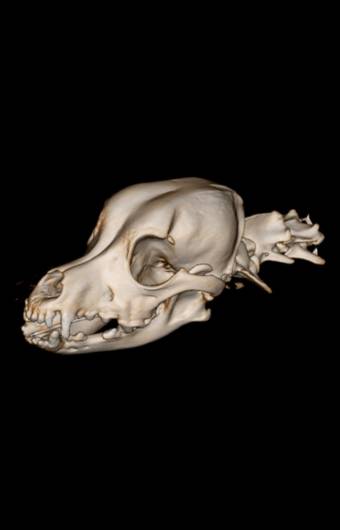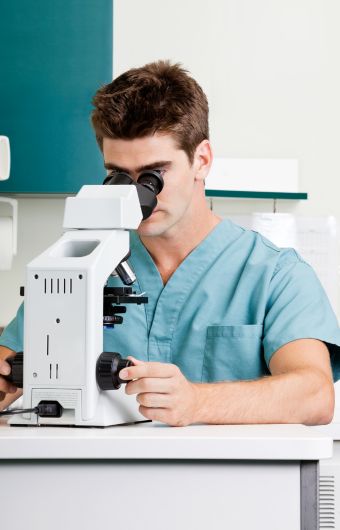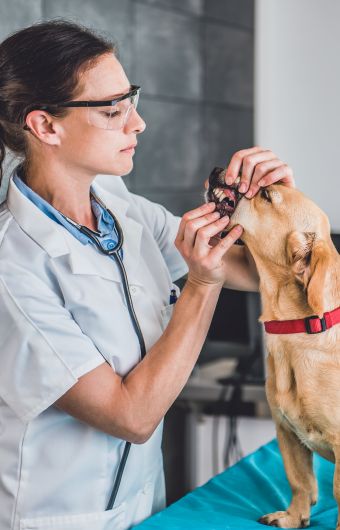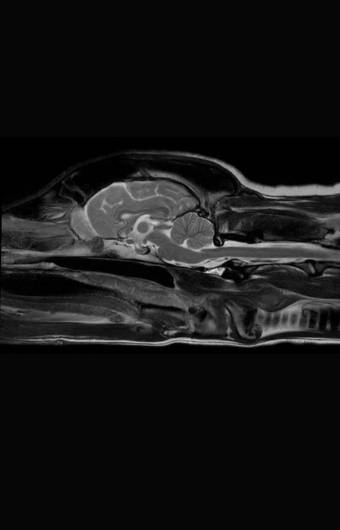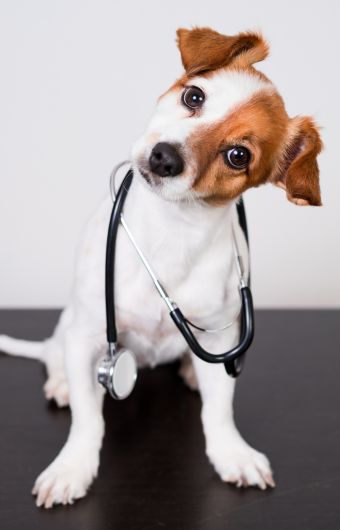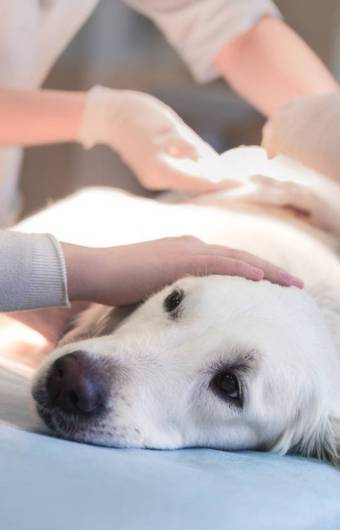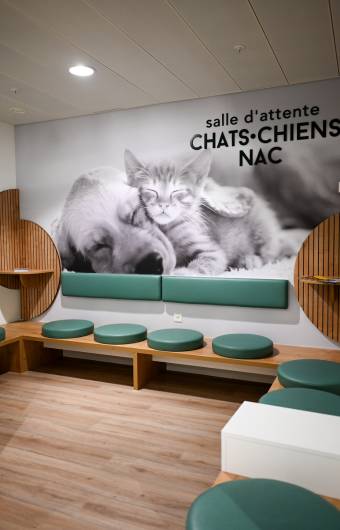Veterinary oncology at the Vétélys Vernier clinic
in Geneva: treatment and support for animals cancers
Veterinary oncology is a discipline specializing in the diagnosis and treatment of cancers in companion animals. At the Vétélys clinic, we offer comprehensive, personalized care:
- Stage 1: initial diagnosis: biopsy for hystological analysis, cytoponctions for cytological
cytological analysis. This diagnosis clarifies the nature of the cancer. - Stage 2: TNM extension assessment using medical imaging: ultrasound, X-ray, CT scan
or MRI. This assessment classifies the cancer and the presence of metastases. - Step 3: tumor surgery (onco-surgery) if the nature of the tumor indicates it.
- Stage 4: advanced treatments such as cancer chemotherapy.
Our team of specialized veterinary surgeons is committed to providing quality care, combining medical expertise and cutting-edge technologies to enhance the comfort and quality of life of your companions. We collaborate with oncology specialists to set up appropriate treatment protocols, and put transparency and ethics at the heart of our dealings with pet owners of pets suffering from cancer.
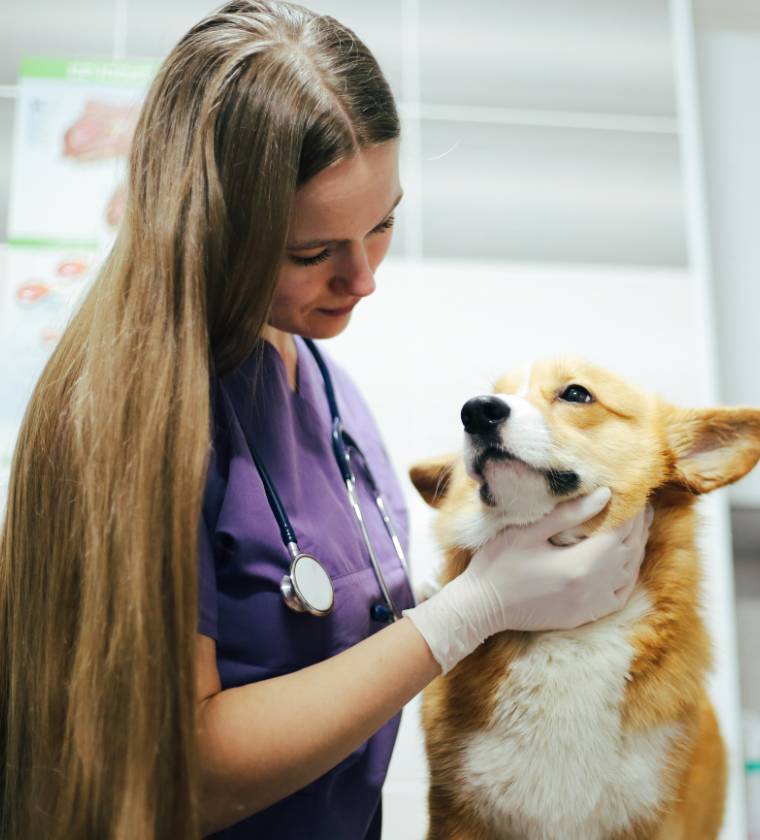
Oncology Vernier Geneva
When to book a consult?
Is your pet in a worrying condition? Find out the main reasons to contact our Oncology veterinary service in Geneva and be treated by one of our vets.
When should my pet be seen by a veterinarian?
If you notice one or more of the following symptoms in your pet, consultation may be necessary.
consultation may be necessary:
- Presence of masses or nodules on or under the skin.
- Unexplained weight loss.
- Skin lesions that do not heal despite treatment.
- Difficulty breathing, limping or persistent pain.
- Changes in behavior or vitality.
Main pathologies treated:
-
Malignant lymphomas: a frequent, multicentric cancer of the lymph nodes
(lymph nodes) and/or internal organs (spleen, liver, intestines). -
Osteosarcoma: an aggressive form of bone cancer, often seen in large breeds of dog.
-
Hemangiosarcoma: malignant tumor generally affecting the spleen, liver or heart.
-
Mastocytomas: skin or subcutaneous cancers, common in dogs.
-
Mammary tumors (adenocarcinomas): particularly common in unspayed females.
-
Oral tumors: e.g. melanoma, squamous cell carcinoma.
-
Skin tumors: fibrosarcoma in cats, etc.
Early diagnosis considerably improves the chances of successful treatment.
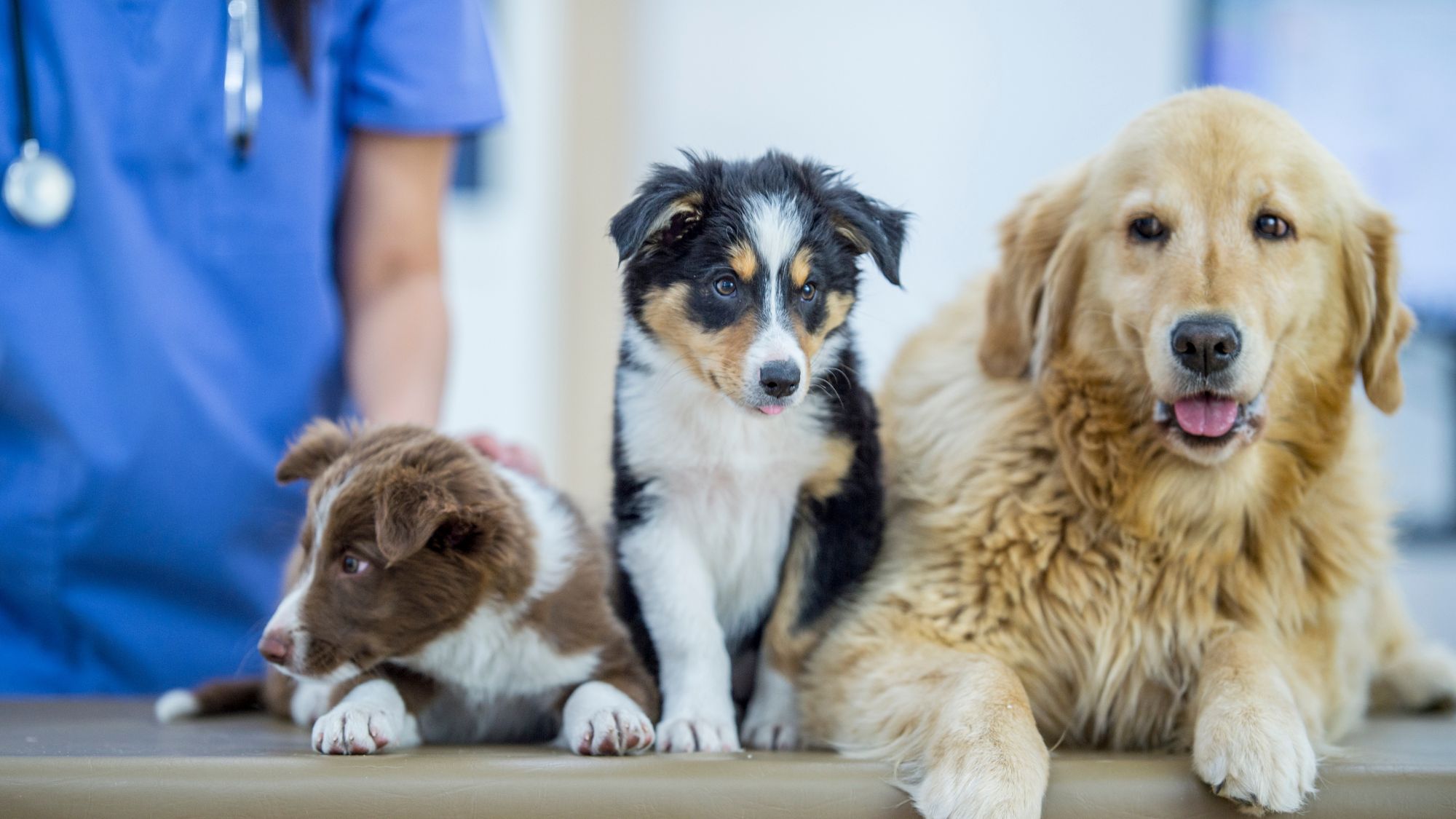
Emergency 24/7
Oncology Vernier Geneva
A veterinary consultation for your pet in oncology animal in oncology in Geneva
A veterinary oncology consultation in Geneva takes place in 4 stages: the initial consultation, followed by an assessment of the extent of the disease, then a treatment plan, and finally personalized follow-up throughout the treatment.
Initial consulting
- Anamnesis and history: we begin by gathering detailed information about your pet’s state of health and medical history. This moment of exchange with you is essential to the care of your pet.
- Thorough clinical examination and discussion of medical history.
- Phase 1 diagnostic tests: cytopuncture or biopsy, blood tests.
- Fast, accurate laboratory results, including cancer type and stage.
Clinic examination
- The role of medical imaging
1. Classic: ultrasound, radiography
2. Cross-sectional: CT scan or MRI - TNM cancer classification: are there any metastases?
Drawing up a treatment plan
- Presentation of available options: onco-surgery, chemotherapy, or other palliative treatments.
- Discussion of therapeutic goals: cure, cancer control, or pain management.
- Planning of a treatment schedule adapted to the patient’s general condition, and presentation of associated estimates.
Personalized follow-up
- Regular check-ups to assess treatment efficacy.
- Quality of life: if necessary, adjustments to the protocol to limit side effects while maintaining treatment efficacy.
Answers to your questions
Find out more about the Vétélys
oncology consultation service
What types of treatment are available in veterinary oncology?
- Onco-surgery: surgical intervention to remove tumors, possibly combined with other treatments for aggressive cancers to maximize the chances of success.
- Anti-cancer chemotherapy: used alone to treat multicentric cancers
cancers such as malignant lymphomas, or in combination with surgery for aggressive cancers such as osteosarcomas or certain mastocytomas. These treatments are well tolerated by most animals, thanks to adapted doses and personalized follow-up. - Radiotherapy, immunotherapy: we collaborate with the AOI center for veterinary radiotherapy in Zug.
- Electrochemotherapy: we collaborate with Dr. Camille Hanot of the Medivet center in Lausanne, a specialist oncologist.
- Palliative treatment: pain and symptom management to improve quality of life in advanced cases.
Will my pet suffer from the side effects of chemotherapy?
Unlike humans, animals generally tolerate chemotherapy very well, and do not shed. The main side effects (vomiting, diarrhoea, fatigue, loss of appetite, leukopenia) are rare and managed with appropriate care and an adapted treatment protocol.
What are the signs that my pet might have cancer?
Common signs include a palpable nodule or mass, unexplained lameness unresponsive to conventional treatments, unusual fatigue, or sudden weight loss. Consult a veterinarian promptly if these symptoms appear.
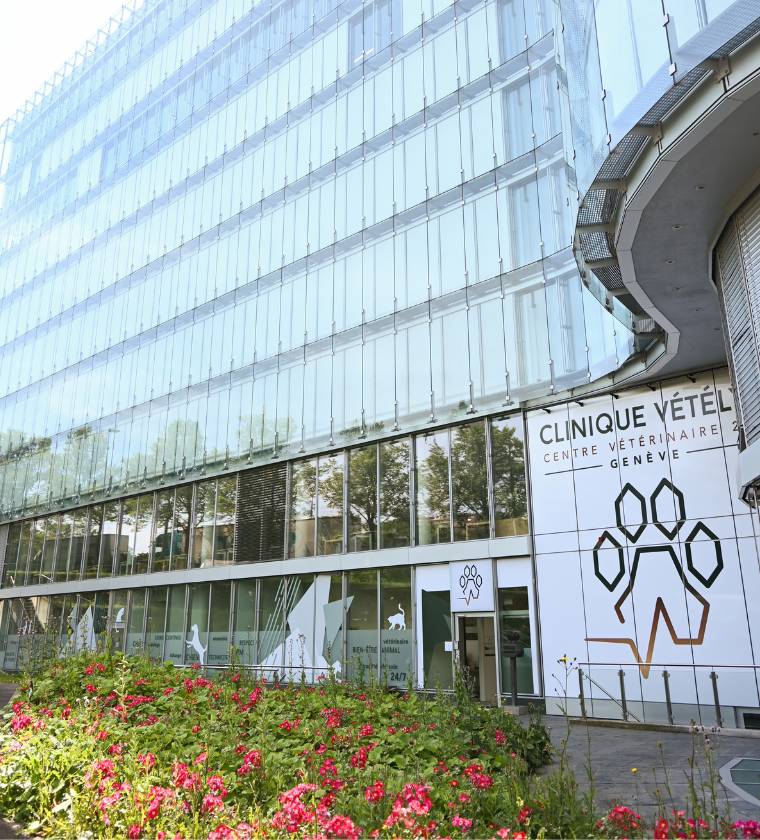
Testimonials
They’ve been to Clinique Vétélys
First experience for a vital emergency for my hamster. Exceptional care, explanations of the risks involved, transparent treatment. Available and attentive. I recommend +++
In all honesty, without exaggeration, 2 times that I come with my male Shimshake and that I find the professionalism of the veterinarians excellent as well as their competences, we have here the Rolls-Royce of the clinics!
Not to mention the magnificent premises!
Happy holidays and good luck to you all!
I would like to thank all the people who took care of my little Rabbit, they all immediately put me at ease, gave me news every day and took the time to answer my questions, they listened to my fears. My little Rabbit was able to return in great shape to the place where I had brought her in critical condition. I can’t thank you enough.
Veterinarians on call H24, excellent recall service. Easy parking, very kind to my baby dog. Super attentive to all questions, excellent contact. I wouldn’t go anywhere else!
Hello to all of you,
Many thanks for your welcome, your attentiveness and your kindness, from your receptionist to your veterinarian Mrs M. METZGER.
We have found a professional practice that has not forgotten to also take the owners into account.
Best regards
I would like to thank the veterinarians and their entire team for their remarkable work. Their expertise, dedication and caring made all the difference for our cat. Thanks to their prompt attention, our cat received the best possible care. I highly recommend this veterinary clinic to anyone looking for quality service and a warm welcome. Many thanks for everything you do!
Expert insight
Advice from our veterinary oncologists:
- Monitor your pet regularly: feel its body for any suspicious lumps.
- Pay close attention to your pet’s behavior: a drop in energy, pain or weight loss should alert you.
- Act quickly: early diagnosis offers the best chance of successful treatment.
Dresse Méd. Vét. Mélanie Metzger, FVH veterinary surgeon candidate, advises :
“We understand that a cancer diagnosis can be overwhelming. Our aim is to guide each owner through suitable treatment options and offer their companions the best possible quality of life.”
Consultations
-
Consultation and initial diagnosis: CHF 200 to 400
-
Onco-surgery: CHF 800 to 3,000 (depending on complexity of procedure)
-
Chemotherapy (per session): CHF 300 to 600
-
Follow-up check-ups: CHF 150 to 300
Each quotation is personalized according to the type of cancer, the treatments required and the patient’s state of health.
Clinic specialties
Discover our other specialties
